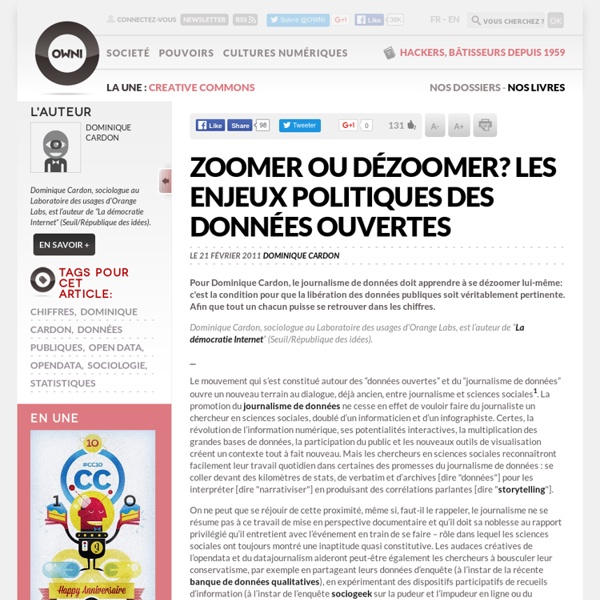



http://owni.fr/2011/02/21/zoomer-ou-dezoomer-les-enjeux-politiques-des-donnees-ouvertes/
Reasons for not releasing data in government » Article » OWNI.eu, Digital Journalism We’re in the first workshop of the day at the CEBIT Gov 2.0 conference. It is led by Andrew Stott, the Director for Digital Engagement for the UK government. The first exercise of the day has been to come up with reasons that government may give for not releasing data online. The Political Power of Social Media On January 17, 2001, during the impeachment trial of Philippine President Joseph Estrada, loyalists in the Philippine Congress voted to set aside key evidence against him. Less than two hours after the decision was announced, thousands of Filipinos, angry that their corrupt president might be let off the hook, converged on Epifanio de los Santos Avenue, a major crossroads in Manila. The protest was arranged, in part, by forwarded text messages reading, "Go 2 EDSA. Wear blk."
UK Launches Open Data Site; Puts Data.gov to Shame A new website dedicated to making non-personal data held by the U.K. government available for software developers has launched today with the help of Sir Tim Berners-Lee, the inventor of the World Wide Web. Data.gov.uk is being slammed with traffic but six months after the U.S. government opened its Data.gov site the U.K. site already has more than three times as much data than the U.S. site offers today. At launch, Data.gov.uk has nearly 3,000 data sets available for developers to build mashups with. The U.S. site, Data.gov, has less than 1,000 data sets today. The UK government has been a big supporter of innovation built on top of public data. It sponsored a contest called Show Us a Better Way, giving cash prizes to people who came up with the best ideas for mashups they would like to create if they had access to the right government data.
Twitter, Facebook, and social activism At four-thirty in the afternoon on Monday, February 1, 1960, four college students sat down at the lunch counter at the Woolworth’s in downtown Greensboro, North Carolina. They were freshmen at North Carolina A. & T., a black college a mile or so away. “I’d like a cup of coffee, please,” one of the four, Ezell Blair, said to the waitress. Journalists of the future need data skills, says Berners-Lee The tax database, visualised. Will future journalists create this? Photograph: guardian.co.uk Are you ready to be a journalist of the future? Better get your head wrapped around the idea of data, then, says Sir Tim Berners-Lee – who, you know, invented the world wide web (which as you also know is not the same as the entire internet).
Anonymous goes after Sony, makes it personal... very personal The hacker collective Anonymous has attacked Sony websites all week, taking them down intermittently in retaliation for Sony's federal lawsuit against PlayStation 3 hacker George Hotz ("GeoHot"). But in recent days, "Operation Sony" morphed from a standard website attack into something a bit more personal, as some Anons formed a separate "Sony Recon" mission and began tracking down corporate executives, their wives, the schools their children attend, and the shops at which they buy their flowers. And the way they obtain that information can be ingenious—and disquieting. Gathering this sort of information is referred to as "doxing" or collecting "dox" on targets, and such data is usually collected and distributed so that others can use it "for the lulz"—amusement, legitimate protest, or harassment.
Will the government spending data really change the world? Government data releases of spending over £25,000 have been spurred on by Francis Maude. But what will it achieve? Photograph: Martin Argles for the Guardian Well, there are a lot of numbers in there. Spurred on by Francis Maude at the Cabinet Office, every government department has released each transaction over £25,000. It's about £80bn of an annual spend of £670bn – the single most detailed public spending data release in British history.